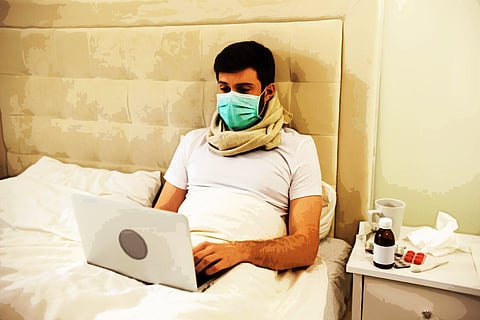

Close to 80% of COVID-19 patients do not require hospitalisation and are best treated at home, say doctors. But those who are in isolation at home will need to monitor their symptoms and general condition to ensure medical assistance or intervention is sought if needed. Apart from this, for patients with asymptomatic to mild COVID-19, a few handy tips will ensure better recuperation.
The first step to take is to isolate the patient in a well lit, ventilated room with a seperate bathroom. All possible windows should be kept open for good circulation of air. All steps have to be taken to ensure maximum possible distance between the patients and others at home.
Plenty of fluids should be consumed--along with water, drinking lemonade, juice of citrus fruits and other such liquids should be regularly consumed to keep the patient hydrated. Lukewarm water can be consumed to ensure there is no congestion. It is best to avoid alcohol consumption as it can dehydrate the patient further. In addition, some studies have shown that COVID-19 can also impact the liver so alcohol could further impact it.
Most doctors and nutritionists have advised consumption of mild, healthy meals if the patient is asymptomatic. If the patient has any congestion of the chest or cough, spicy and oily food should be avoided. It is a good idea to consume food items with high protein content like eggs, lentils, broccoli, oats and almonds.
The patient is often advised plenty of rest. Most may experience body pain as well so any taxing activity should be avoided. In case of no symptoms, basic stretching inside the room is suggested. In case of body pain or slightly high temperature, a simple over-the-counter paracetamol can be taken. In case it persists, medical advice should be taken.
The most important step while being at home in isolation is to ensure prompt and frequent monitoring of vital stats. Oxygen saturation level, body temperature, blood pressure and sugar levels have to be monitored frequently. Any deviation from the normal range will have to be reported to a medical practitioner.
Regular proning will help maintain healthy oxygen levels. Gargling twice a day will keep throat infections at bay and taking steam at least thrice a day will help relieve any congestion. Any breathing difficulties should be immediately reported to a doctor.
Some studies have shown that supplements of Vitamin C, Vitamin D and Zinc might help fight the virus as well as boost immunity. While Vitamin C is an antioxidant, Vitamin D is believed to boost immunity while Zinc is known to be anti-viral. But the supplements should be consumed in moderation with a prescription from a doctor.